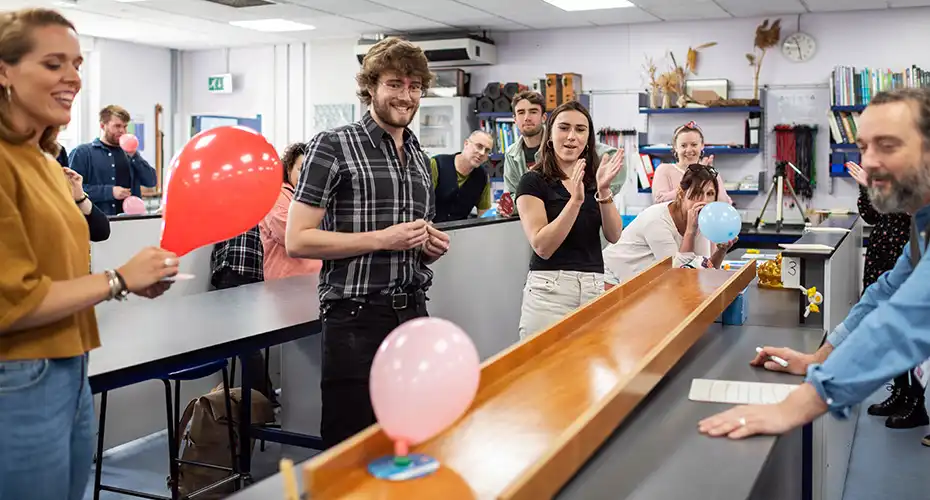Overview
- Gain the knowledge, skills and experience to teach all subjects effectively and creatively within the primary 3-7 curriculum
- Develop your confidence, competence and independence as a teacher with the unique Exeter Model of Initial Teacher Education which progressively increases your school-based teaching over three terms
- In addition, develop your curriculum lead potential by exploring your knowledge of early years curriculum design, teaching and assessment in greater depth and engaging in leadership enrichment opportunities
- Train to be a classroom teacher in two schools within our Partnership area (East & South Devon, Dorset & Somerset, Mid & North Devon, West Devon & Cornwall) or in London
- Receive support and guidance from expert school mentors and university tutors
- Join a supportive community of trainees and teachers who are passionate about education and research and will support you during your course and beyond
Rated Ofsted outstanding for our Primary ITE courses
Diverse placement opportunities across the region
Top 150 in the world for Education
100% of our Education research has internationally excellent impact
Rated Ofsted outstanding for our Primary ITE courses
Diverse placement opportunities across the region
Entry requirements
Primary PGCE students must have an honours degree and GCSE English, Maths and Science at Grade C/4 or equivalent. A satisfactory medical assessment and DBS enhanced check are also requirements for entry to this programme. Selection is based on the information provided on the DfE Apply application and on performance at interview.
We will consider applications from students with a 2:2 Honours degree or above. Relevant experience will also be considered.
Typically, successful applicants have a grade B/5 at GCSE in English and Mathematics and a grade C/4 in Science.
For applicants without the required GCSE pass at grade C/grade 4 we accept a Grade 4 pass in the English, Mathematics and Science equivalency tests offered by A Star Equivalency and equivalencytesting.com (please do contact the PGCE Admissions team for further guidance before signing up for an equivalency test). See here for full list of accepted English/Maths/Science equivalent qualifications.
We want all potentially excellent teachers to have the opportunity to train. If your qualification profile does not fit the norm, please do contact us.
Entry requirements for international students
Please visit our entry requirements section for equivalencies from your country and further information on English language requirements.
Read more
Entry requirements for international students
English language requirements
International students need to show they have the required level of English language to study this course. The required test scores for this course fall under Profile . Please visit our English language requirements page to view the required test scores and equivalencies from your country.
Course content
Your Primary PGCE (3-7) course will teach you the fundamentals underpinning primary teaching and learning along with practical ideas for classroom teaching in all subjects. Rooted in research evidence, you will develop your own subject knowledge whilst exploring how different areas of the curriculum link and how children learn as they develop from age 3 to 7.
20 days of the course are dedicated to Intensive Training & Practice, focusing on four themes of teaching and learning which enable you to delve deeply into particular key areas. You will learn about principles underpinning each theme, work with expert practitioners in university and school settings, and use the Exeter Model Framework to reflect on and synthesise your learning.
During your placements, you will have the opportunity to put the skills learned into practice whilst being fully supported by a Mentor who will work as an expert partner and challenge your thinking about teaching in ways that can be used to enhance your performance.
You will also focus on leadership development in the early years curriculum area where you will consider the methods, skills and processes distinct to teaching in the 3-7 age range.
The course you will study as a Primary (3-7) student includes these modules:
- Primary (3-7) Education Theory, Research and Practice
- Primary (3-7) Professional Learning in Schools
- Primary (3-7) Curriculum Theory, Research and Practice
- Primary (3-7) Leadership Development
The modules we outline here provide examples of what you can expect to learn on this course based on recent teaching. The precise modules available to you in future years may vary depending on staff availability and research interests, new topics of study, timetabling and student demand.

Ruth Flanagan
Primary PGCE Programme Director

Dr Emese Hall
Senior Lecturer in Art Education

Dr Taro Fujita
Associate Professor in Mathematics Education

Anthony Wilson
Senior Lecturer in Education

Harriet White
Lecturer in Education

Anita Wood
Lecturer in Education
Ruth Flanagan
Primary PGCE Programme Director
I have taught at primary, secondary, adult education, undergraduate and post graduate levels. Having lived and worked in India, Russia and Ethiopia my research interests are in intercultural communication, the origins and evolution of worldviews and the significance of these on education throughout the world.
Profile page
Ruth Flanagan
Primary PGCE Programme Director
I have taught at primary, secondary, adult education, undergraduate and post graduate levels. Having lived and worked in India, Russia and Ethiopia my research interests are in intercultural communication, the origins and evolution of worldviews and the significance of these on education throughout the world.
Profile page
Dr Emese Hall
Senior Lecturer in Art Education
Dr Emese Hall has a particular interest in primary art and design, drawing and visual literacy and her doctoral research focused on the communicative potential of young children’s drawings. Her current research centres on art education for the Earth Crisis, and she is also interested in teachers’ professional learning and reflection. Prior to her university work, Emese was a primary school teacher in Devon. She is a former Vice-President of the National Society for Education in Art and Design and former South-West Regional Network Co-ordinator for the Cambridge Primary Review Trust.
Profile page
Dr Taro Fujita
Associate Professor in Mathematics Education
Taro trained as a primary and secondary school teacher in Japan, and completed his PhD at the University of Southampton. He has 10 years’ experience working in the field of mathematics education both in Japan and the UK, where he has been involved in teacher training in primary/secondary mathematics education, teaching undergraduate mathematics and research.
Profile page
Anthony Wilson
Senior Lecturer in Education
I am interested in how far teachers perceive their practice to be 'creative'; and in the notions of creativity they believe in. I am also interested in exploring how far creativity can be modelled to children by teachers and what such practice might look like.
Profile page
Harriet White
Lecturer in Education
Harriet White studied Outdoor Education and Natural History at Antioch University, Ohio, USA which is where she found her vocation for teaching and learning. Her undergraduate training as a zoologist led her to become a strong advocate for outdoor learning and learning for sustainability. Harriet completed her PGCE in Primary Science here at the University of Exeter. Her research interests are currently linked with the Re-Place Research Group which researches the connections and effects of environment and sustainability on the relational pedagogies of trainee teachers.
Profile page
Anita Wood
Lecturer in Education
Anita Wood began her teaching career in the London Borough of Tower Hamlets where she worked for ten years with children from Reception to Year 6. During her time working in Tower Hamlets she worked extensively with children and families with English as an Additional Language. She held various positions at this time, humanities co-ordinator; literacy co-ordinator; EAL co-ordinator; and Lead Literacy teacher. She also worked as a key member of the senior management team in two very large primary schools.
Profile page
Fees
2025/26 entry
- UK: £9,535 full-time
- International: £24,700 full-time
A variety of attractive financial support packages are available. Find out more.
Scholarships
The University of Exeter has many different scholarships available to support your education, including £5 million in scholarships for international students applying to study with us in the 2025/26 academic year, such as our Exeter Excellence Scholarships*.
Financial support is also available for students from disadvantaged backgrounds, lower income households and other under-represented groups to help them access, succeed and progress through higher education.
* Terms and conditions apply. See online for details.
Find out more about tuition fees and scholarships
Teaching and research
We provide unrivalled opportunities for trainees to achieve through our highly original Exeter Teaching Model. The programme runs over three terms with each term providing progressively more school-based work training.
The taught element is made up of timetabled seminars, lectures and self-directed study. You will be asked to work individually and as part of small and larger groups. You will be supported in developing the full range of teaching skills and effective reflection that you will need in your first teaching post as an Early Career Teacher (ECT).
Learning is primarily face to face during campus-based teaching with some online learning, and wholly face to face during school experience placements. The campus-based elements of the course are taught mainly through seminars and workshops with a significant element of directed collaborative group work and self-study. Some modules also involve field trips. All modules are assessed through course work and there are no final examinations.
More details on the course structure can be found here
Facilities and support
You’ll have access to a range of support, including a personal tutor, materials available through our online learning environment including lecture notes, presentations, film clips and reading materials, and access to the University’s wellbeing and support services.
Research-led teaching
You will join a vibrant postgraduate community at the School of Education, studying with some of the leading scholars in their disciplines.
You will benefit from our active research culture, which promotes the sharing of ideas and knowledge to encourage innovation. Our research centres provide a focus for research and discussion for academic staff, researchers and practitioners and organise seminar series, outside speakers, conferences and other events.
Read more
Careers
The PGCE provides excellent grounding for a long career within education, whether you aspire to become an outstanding classroom practitioner, school leader, or specialist in a specific area of education, the opportunities are broad.
Career support
Careers support including skills training, internships, jobs vacancies, employment fairs and other events is available through the Career Zone.
Top 150 in the world for Education
100% of our Education research has internationally excellent impact






.webp)










